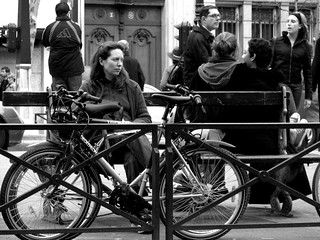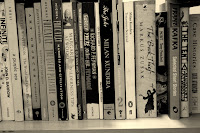Stargardt's has defined my choices in life. It has also defined other people's choices about me. Every day I face a prejudiced world, a world that only understands "normal", that often tries to weigh me down with its distorted perspectives and its coloured opinions.
Most of the days I can easily shrug them off, but sometimes they settle deep. Some I manage to remove over time, but some just linger like so many other things in life.
I could have finished my Ph.D in French literature some years back, had the doctors not told me to stop to read.
I would have not lost a relstionship, had they not disabled me in their imagination. We were not left any choice. I've still not been able to deal with that empty space.
...
There are other things that lie beneath. Things that we think we are comfortable with. But we forget the dimension of time. We forget that everything evolves, even the past.
Some people say they have become comfortable with Stargardt's. Am I comfortable with Stargardt's? I don't know. I'm not even sure what is the right answer. Acceptannce and being comfortable are two different things.
Discomfort can be positive. Like an exercise in reverse. It can thrust you forward to force you find a way. If people act as mirrors and if we are constantly trying to adjust our reflections to their mirrors, perhaps I constantly adjust my life to not be that reflection. Because their reflections are all "normal". And I'm a different person.
Most of the days I can easily shrug them off, but sometimes they settle deep. Some I manage to remove over time, but some just linger like so many other things in life.
I could have finished my Ph.D in French literature some years back, had the doctors not told me to stop to read.
I would have not lost a relstionship, had they not disabled me in their imagination. We were not left any choice. I've still not been able to deal with that empty space.
...
There are other things that lie beneath. Things that we think we are comfortable with. But we forget the dimension of time. We forget that everything evolves, even the past.
Some people say they have become comfortable with Stargardt's. Am I comfortable with Stargardt's? I don't know. I'm not even sure what is the right answer. Acceptannce and being comfortable are two different things.
Discomfort can be positive. Like an exercise in reverse. It can thrust you forward to force you find a way. If people act as mirrors and if we are constantly trying to adjust our reflections to their mirrors, perhaps I constantly adjust my life to not be that reflection. Because their reflections are all "normal". And I'm a different person.









